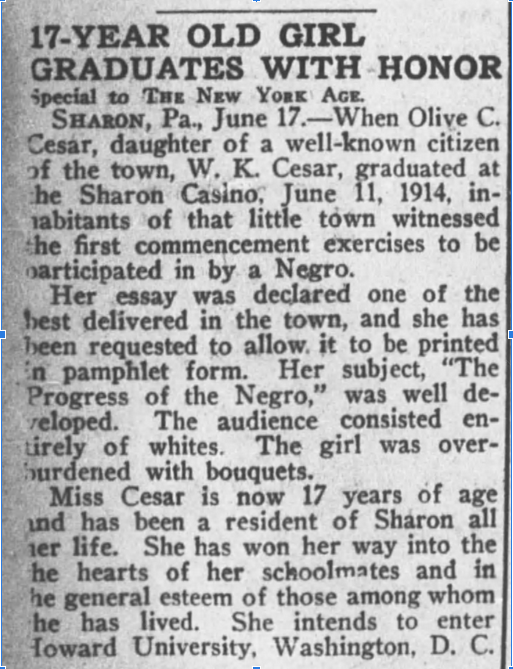The Cesar Women (L to R): Olive Cesar Peters, Nancy Cesar, Nancy Cesar, Mary Cesar Lassiter, and Mathilda Cesar Willams (ca. 1947ish).
Over the past academic year, history teacher Rhonan Mokriski and his students at a high school in Salisbury, Ct have been pursuing a project-based learning course in public history focused on uncovering the lives of free and enslaved African American families in northwestern Connecticut. This blog chronicles that journey.
By Jake Brink ’22, a Junior in SAlisbury, ct
This year, my class and I have been collaborating with Cesar family descendant, Katherine Overton, to research and learn more about the community roots of this local family. Recently, I had reached a plateau and I was having trouble finding an angle that would be different from that of my classmates. So, I looked at the data we collected through a new lens and began to realize how remarkable the Cesar family women were!
I reached out to Ms. Overton to explore how the Cesar women used education to overcome the racism and discrimination of their time.
The reality for rural, Connecticut, African American women was that they could really only be domestic workers, nursemaids, servers, or cleaners. As I read and found out more about the Cesar women, I was struck by the importance of education in their lives. From here, I learned about the amazing opportunities Historic Black Colleges and Universities (HBCUs) gave Black women. Ms. Overton sent me a lot of information and introduced me to Ward Cesar and his wife Nancy and their extraordinary daughters who overcame the social discrimination and used education to change their lives.
Ward K. Cesar was born and raised in Sharon, Connecticut in 1857, where he fathered three boys and four daughters: Matilda Eleanor Cesar, Olive Cesar Peters, Mary Cesar Lassiter, and Eleanor Cesar (who unfortunately passed away at a young age).

Olive Cesar was the third born, and she excelled in school, achieving honors each year. She was often featured in different newspapers such as The New York Age and the Connecticut Western News. Olive’s daughter gave Ms. Overton a letter that Olive’s mother Nancy Cesar wrote to her on her 24th birthday that congratulated her on all her academic achievements and for graduating college. Olive would later move to North Carolina, where she accepted a position as a teacher in a preparatory school and later taught at Howard University.
Mary Lassiter was the youngest daughter of Ward and Nancy Cesar, and she was also an honor roll student and also often featured in the newspaper for her academic achievements. She attended Hampton University and eventually pursued a career in teaching and attained a Master of Arts.

Matilda Cesar was the 2nd born child, and she gave birth to Rae Elinor Williams (Ms. Overton’s mother). She unfortunately was unable to go to college because she had to work as a domestic in order to raise her daughter and send her to college.
Rae was also lauded for her academic achievements, which were featured in the newspapers. She attended Howard University and graduated in the class of 1942 with a BA in Social Work.
These women all worked extremely hard to both support their families as well as move up in society. Because they were both Black and women, they had all the odds stacked against them. Despite that, many of them completed college and were able to live long, fulfilling, and productive lives; but until now, only their family knew about them. They were simply overlooked. I am hoping my classmates and I can change that. They endeavored too hard and overcame impossible odds to simply have their history ignored. These women are so remarkable, they refused to remain voiceless. By using education, they achieved the impossible. Hopefully we can now shine a light on the extraordinary Cesar women and share their history.


An excellent choice to make the Cesar women a central focus by telling their triumphs and contributions. This is just one family story of many Black women who are woven into the tapestry of the United States. I am elated to read a perspective from a young adult who will be shaping how we as country see each other in the future by exploring and acknowledging our past. Thank you for spreading awareness of all those who make up our American history.